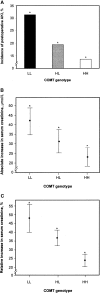Decreased catecholamine degradation associates with shock and kidney injury after cardiac surgery
- PMID: 19406978
- PMCID: PMC2689901
- DOI: 10.1681/ASN.2008080915
Decreased catecholamine degradation associates with shock and kidney injury after cardiac surgery
Abstract
Enzymatic pathways involving catechol-O-methyltransferase (COMT) catabolize circulating catecholamines. A G-to-A polymorphism in the fourth exon of the COMT gene results in a valine-to-methionine amino acid substitution at codon 158, which leads to thermolability and low ("L"), as opposed to high ("H"), enzymatic activity. We enrolled 260 patients postbypass surgery to test the hypothesis that COMT gene variants impair circulating catecholamine metabolism, predisposing to shock and acute kidney injury (AKI) after cardiac surgery. In accordance with the Hardy-Weinberg equilibrium, we identified 64 (24.6%) homozygous (LL), 123 (47.3%) heterozygous (HL), and 73 (28.1%) homozygous (HH) patients. Postoperative catecholamines were higher in homozygous LL patients compared with heterozygous HL and homozygous HH patients (P < 0.01). During their intensive care stay, LL patients had both a significantly greater frequency of vasodilatory shock (LL: 69%, HL: 57%, HH: 47%; P = 0.033) and a significantly longer median duration of shock (LL: 18.5 h, HL: 14.0 h, HH: 11.0 h; P = 0.013). LL patients also had a greater frequency of AKI (LL: 31%, HL: 19.5%, HH: 13.7%; P = 0.038) and their AKI was more severe as defined by a need for renal replacement therapy (LL: 7.8%, HL: 2.4%, HH: 0%; P = 0.026). The LL genotype associated with intensive care and hospital length of stay (P < 0.001 and P = 0.002, respectively), and we observed a trend for higher mortality. Cross-validation analysis revealed a similar graded relationship of adverse outcomes by genotype. In summary, this study identifies COMT LL homozygosity as an independent risk factor for shock, AKI, and hospital stay after cardiac surgery. (ClinicalTrials.gov number, NCT00334009).
Figures




Comment in
-
Complex renal traits: role of adrenergic genetic polymorphism.J Am Soc Nephrol. 2009 Jun;20(6):1172-4. doi: 10.1681/ASN.2009040395. Epub 2009 May 21. J Am Soc Nephrol. 2009. PMID: 19470671 No abstract available.
References
-
- Mekontso-Dessap A, Houel R, Soustelle C, Kirsch M, Thébert D, Loisance DY: Risk factors for post-cardiopulmonary bypass vasoplegia in patients with preserved left ventricular function. Ann Thorac Surg 71: 1428–1432, 2001 - PubMed
-
- Lassnigg A, Schmidlin D, Mouhieddine M, Bachmann LM, Druml W, Bauer P, Hiesmayr M: Minimal changes of serum creatinine predict prognosis in patients after cardiothoracic surgery: Prospective cohort study. J Am Soc Nephrol 15: 1597–1605, 2004 - PubMed
-
- Benedict CR, Rose JA: Arterial norepinephrine changes in patients with septic shock. Circ Shock 38: 165–172, 1992 - PubMed
-
- Landry DW, Oliver JA: The pathogenesis of vasodilatory shock. N Engl J Med 345: 588–595, 2001 - PubMed
-
- Day TA, Randle JC, Renaus LP: Opposing alpha- and beta-adrenergic mechanisms mediate dose-dependent actions of noradrenaline on supraoptic vasopressin neurones in vivo. Brain Res 358: 171–179, 1985 - PubMed
Publication types
MeSH terms
Substances
Associated data
LinkOut - more resources
Full Text Sources
Other Literature Sources
Medical
Miscellaneous

